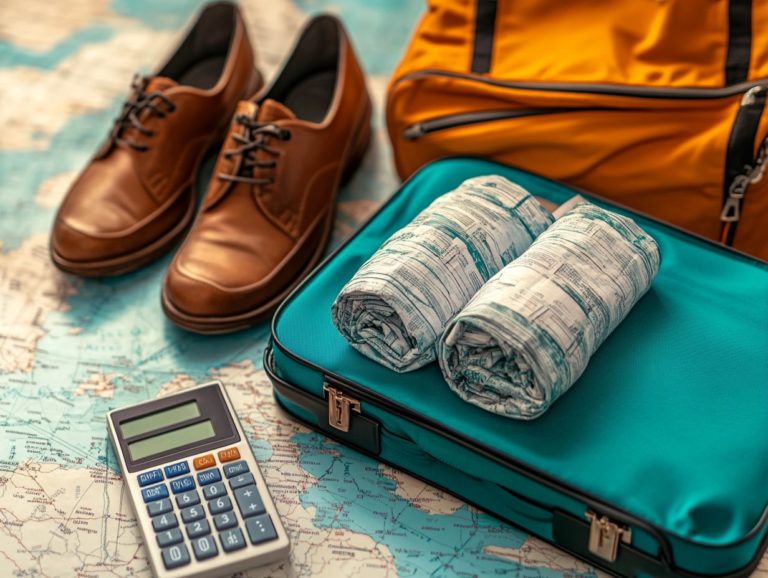How to Travel for Free with Volunteer Programs
Volunteer travel presents a remarkable fusion of adventure and altruism. It enables you to discover new destinations while leaving a positive mark on the world!
This approach underscores the myriad benefits of participating in volunteer programs. These benefits range from personal growth and cultural immersion to significant cost savings and meaningful contributions to communities.
It explores various types of programs, including:
- Environmental conservation
- Community development
- Animal welfare
It also provides guidance on selecting the right program and preparing for your journey. Get ready to embark on a fulfilling travel experience that enriches not only your life but also the lives of the communities you touch!
Contents
- Key Takeaways:
- What is Volunteer Travel?
- Benefits of Traveling with Volunteer Programs
- Types of Volunteer Programs
- How to Find and Choose a Volunteer Program
- Preparing for a Volunteer Trip
- Frequently Asked Questions
- 1. How can I travel for free with volunteer programs?
- 2. What types of volunteer programs offer free travel?
- 3. Are there any age restrictions for participating in free volunteer programs?
- 4. Do I need any special skills or qualifications to join a free volunteer program?
- 5. Can I choose where I want to travel with a free volunteer program?
- 6. Are there any hidden costs associated with free volunteer programs?
Key Takeaways:
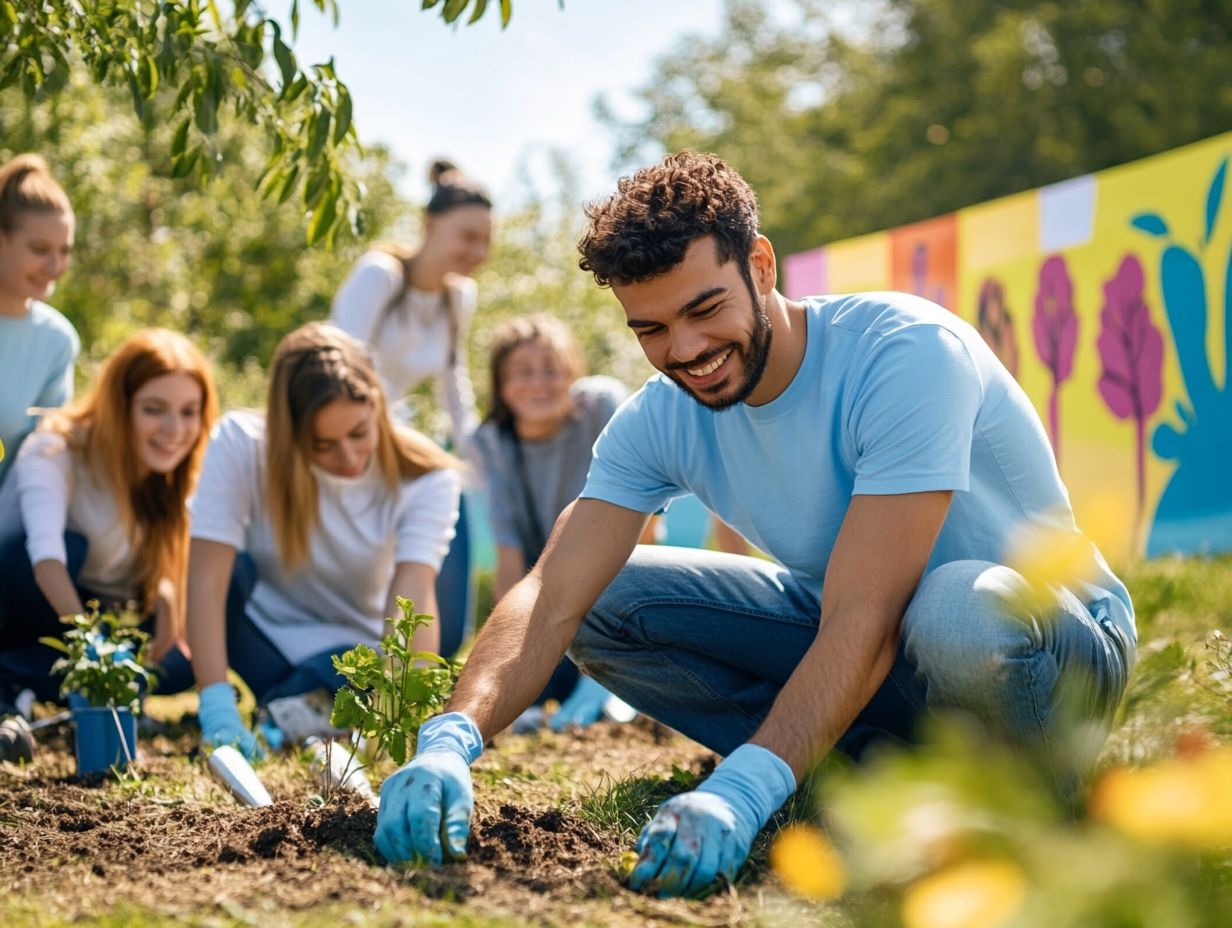
- Volunteer travel allows for personal growth and cultural immersion while giving back to communities in need.
- Types of volunteer programs include environmental conservation, community development, and animal welfare.
- Research and evaluate programs before choosing one. Prepare for your trip by considering logistics and cultural sensitivity.
What is Volunteer Travel?
Volunteer travel offers a unique opportunity for you to engage in meaningful work while exploring new destinations. This experience allows you to immerse yourself in local cultures and contribute to impactful projects that support communities, non-profit organizations, and various initiatives across the globe.
Through these programs, you gain invaluable experiences and forge lasting connections with local individuals. Your efforts can lead to significant helping communities and the environment by engaging in activities like teaching, conservation, and community development.
Benefits of Traveling with Volunteer Programs
Traveling through volunteer programs presents a remarkable array of benefits that go far beyond simple sightseeing. You ll experience invaluable personal growth and immerse yourself in diverse cultures.
Along the way, you ll build essential skills and foster genuine connections with locals. This enriches your journey in ways you might never have imagined!
Personal Growth and Cultural Immersion
Engaging in volunteer travel truly fosters personal growth. It encourages you to step beyond your comfort zone while immersing yourself in rich cultural experiences through direct interactions with local communities.
These experiences equip you with invaluable skills such as teamwork, problem-solving, and adaptability. These qualities are essential in today’s fast-paced and interconnected world.
For example, collaborating with local organizations on community projects gives you hands-on experience in fields like education, environmental conservation, or healthcare. You also develop a profound understanding of cultural nuances and social issues.
Such meaningful exchanges can inspire you to reflect on your own values and beliefs. This cultivates greater empathy and a sense of global citizenship. Sharing meals with locals or taking part in traditional festivals creates personal connections that transcend language barriers.
Cost Savings and Giving Back
Participating in volunteer programs often leads to significant cost savings. Many organizations provide low-cost or even free options that include accommodation and meals. This allows you to give back to communities while managing your budget effectively.
When you volunteer, you enhance your travel experiences and cultivate a deeper connection to the places you visit. This commitment to community support can reveal additional options like scholarships and grants aimed at altruistic travelers.
Such funding opportunities enable you to offset program costs, making transformative experiences more accessible. Volunteering fosters meaningful relationships with local residents and fellow volunteers, enriching your journey and instilling a sense of purpose.
By embracing these experiences, you can explore new cultures while actively contributing to sustainable development and positive change in the communities you engage with!
Types of Volunteer Programs
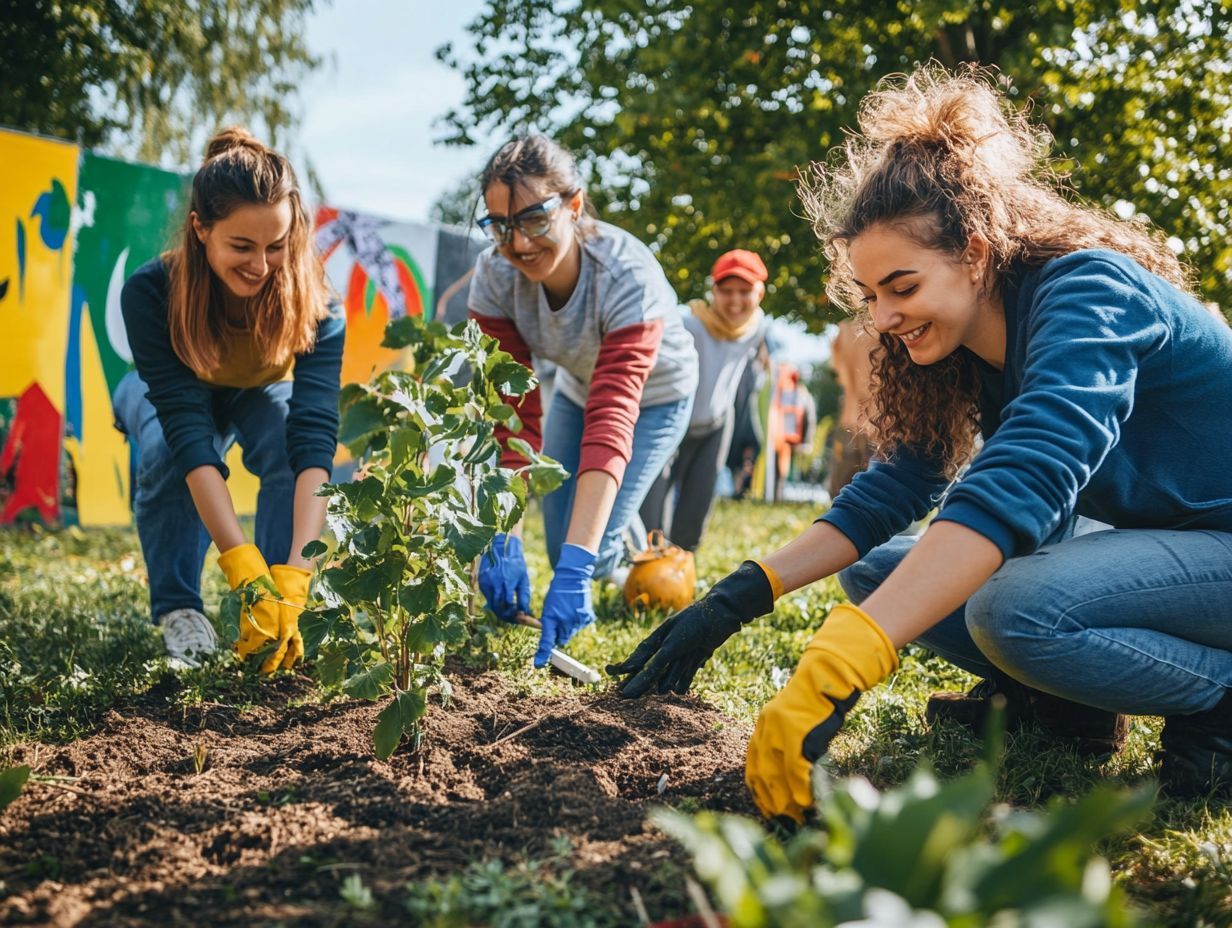
Volunteer programs offer a diverse range of focuses and purposes, enabling you to select from various options. Whether you re drawn to environmental conservation, community development, or animal welfare, each program is thoughtfully designed to meet specific societal or ecological needs.
Get ready to explore three exciting types of volunteer programs that can help make a difference!
Environmental Conservation
Environmental conservation volunteer programs place you at the heart of sustainability and the protection of natural ecosystems the natural communities of plants and animals. You ll dive into eco-friendly projects that champion environmental stewardship and conservation efforts.
These initiatives often encompass reforestation activities, wildlife habitat restoration, and marine conservation projects. By participating, you contribute to the protection of endangered species, enhance air and water quality, and help build resilient communities.
Whether you re planting trees in urban settings or participating in beach clean-ups along coastlines, your efforts promote ecological balance and educate you about pressing environmental challenges. This collaborative approach helps you become an advocate for sustainable practices, inspiring others to join the cause.
Community Development
Community development volunteer programs are designed to help communities earn more money and uplift local populations through education and social initiatives. You ll engage in hands-on projects that truly make a difference.
These initiatives often involve activities like building infrastructure, organizing health camps, or providing mentorship in schools. These efforts have a direct impact on the lives of residents.
Working alongside local leaders and residents, you share your knowledge while immersing yourself in the cultural nuances and challenges the community faces. This mutual exchange strengthens relationships and fosters a sense of ownership among locals, ensuring that the benefits of these programs are both sustainable and long-lasting.
Your involvement is not just about giving; it s about growing together in a meaningful and impactful way.
Animal Welfare
Animal welfare volunteer programs offer you a unique opportunity to dive into the rewarding world of animal rescue and rehabilitation. You ll have the chance to work hand-in-hand with organizations committed to protecting both wildlife and domestic animals in need.
As a volunteer, you ll engage in fulfilling activities from feeding and grooming rescued animals to socializing with them and assisting with educational outreach and community awareness initiatives. Your contributions aren t just about providing immediate care; they cultivate a more compassionate environment for all living beings.
Organizations like the ASPCA, World Wildlife Fund, and local animal shelters depend on your dedication. By stepping up today, you re not just helping animals; you re becoming part of a vital movement for change.
How to Find and Choose a Volunteer Program
Finding and selecting the right volunteer program requires a careful and thoughtful approach. Conduct thorough research and evaluate a range of opportunities to ensure they resonate with your personal values and aspirations.
Each choice should reflect your commitment to meaningful engagement and the positive difference you aim to create. Take action and make a lasting impact today!
Researching and Evaluating Programs
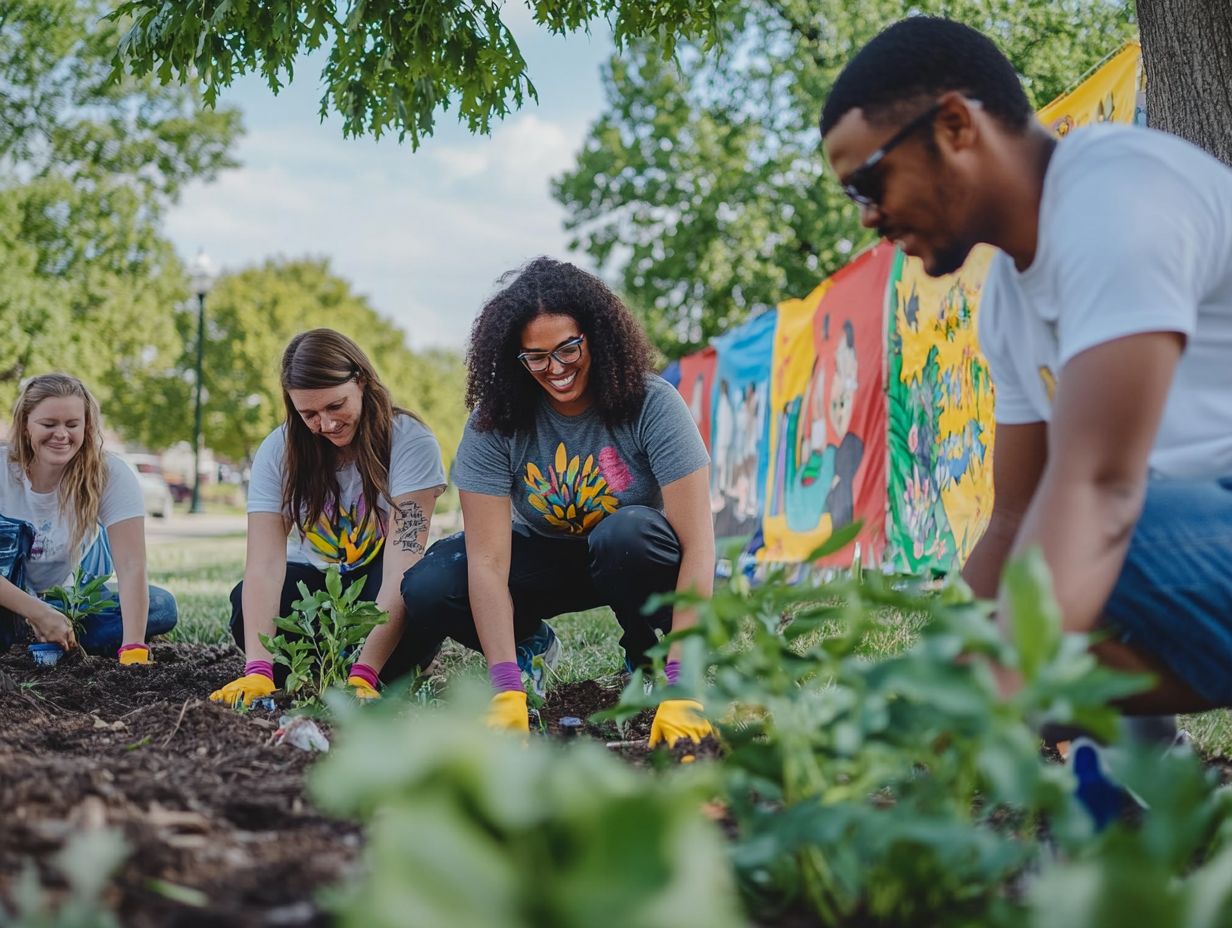
Conducting thorough research and evaluating volunteer programs is essential for ensuring a meaningful and impactful experience. This involves examining the reputation of organizations, reading participant feedback, and understanding the scope of projects.
To kick off this process, utilize online platforms that specialize in volunteer reviews, where past participants candidly share their experiences. Analyzing these testimonials will offer valuable insights into the organization’s reliability and the quality of the projects they offer.
Make sure your personal values match the program’s mission! This alignment can significantly boost your satisfaction and growth as a volunteer.
Engage with current volunteers through social media or forums for valuable information. This helps you make informed decisions about which opportunities will best suit your skills and aspirations.
Preparing for a Volunteer Trip
Preparing for a volunteer trip requires careful planning and thoughtful consideration of the details of planning your trip, being aware and respectful of local cultures, and travel arrangements. This attention to detail ensures a seamless transition into your volunteer experience and fosters respectful engagement with the local communities you aim to support.
Logistics and Cultural Sensitivity
Understanding the details of planning your trip and being aware and respectful of local cultures is essential as a volunteer. It fosters respectful interactions with local communities and enhances your overall experience in volunteer work.
Navigating the complexities of planning enables you to effectively coordinate your efforts, optimizing available resources while minimizing disruptions.
Before you embark on a mission, familiarize yourself with local customs and traditions, as these can significantly shape your interactions.
For instance, learning a few basic phrases in the local language like greetings can break the ice and showcase your genuine respect. Being mindful of dress codes and social etiquette, such as appropriate gestures and communication styles, helps you avoid misunderstandings.
By prioritizing cultural awareness alongside logistical considerations, you not only elevate your contributions but also foster meaningful relationships within the communities you serve.
Frequently Asked Questions
1. How can I travel for free with volunteer programs?
You can travel for free by volunteering with organizations that cover your travel expenses, such as airfare and accommodation. This allows you to explore new places and give back to the community at the same time.
2. What types of volunteer programs offer free travel?
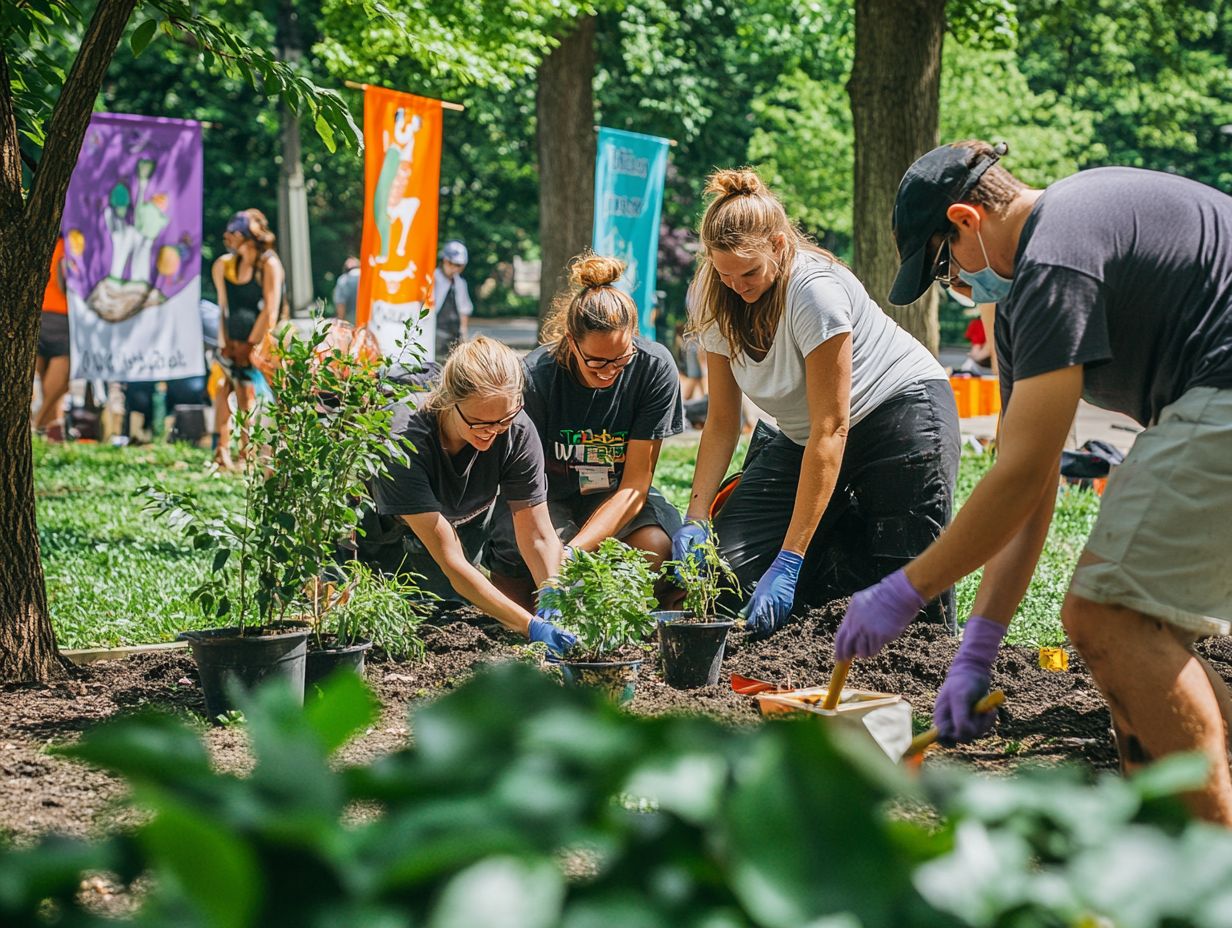
There are various types of volunteer programs that offer free travel, including environmental conservation, community development, and disaster relief programs. For those interested in exploring these options, consider checking out shoestring travel opportunities. It’s important to research and find a program that aligns with your interests and skills.
3. Are there any age restrictions for participating in free volunteer programs?
Most organizations do not have age restrictions for their volunteer programs; however, some may require volunteers to be at least 18 years old. It’s best to check with the specific program you are interested in to confirm their age requirements.
4. Do I need any special skills or qualifications to join a free volunteer program?
While some programs may require specific skills or qualifications, many volunteer opportunities do not require any prior experience. Some organizations may provide training or orientation to prepare volunteers for their specific tasks.
5. Can I choose where I want to travel with a free volunteer program?
Yes, you can usually choose your preferred destination when applying for a volunteer program. However, keep in mind that some locations may have more demand for volunteers than others, so it’s best to be flexible with your choices.
Most organizations offering free volunteer programs cover major expenses. However, it’s crucial to clarify this before you commit to a program.
Keep in mind that you might need to pay for personal expenses like meals, visas, and travel insurance. Always check for any additional costs to avoid surprises!




